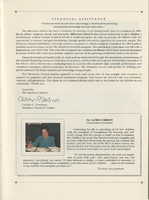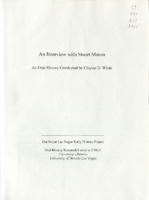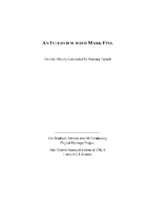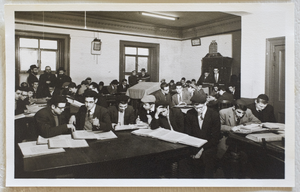Search the Special Collections and Archives Portal
Search Results
Audio clip from interview with Al Levy by Cheryl Caples, February 23, 1979
Date
Archival Collection
Description
Part of an interview with Al Levy on February 23, 1979. In this clip, Levy discusses his childhood, living in Las Vegas, and his experience at Las Vegas High School.
Sound

Program from event at Treasure Island at the Mirage, Tenth Anniversary Scholarship Benefit for the Meadows School, May 20, 1994
Date
Archival Collection
Description
The "Presidential Evening" event at Treasure Island was held to raise funds for the Nat Hart Scholarship Endowment Fund and General Scholarship Fund for the Meadows School in Las Vegas.
Text

Transcript of interview with Stuart Mason by Claytee White, November 9, 2006
Date
Archival Collection
Description
In this interview, Stuart Mason discusses his family's construction business, Taylor Construction Co., and his involvement with building various Las Vegas Strip hotels including Caesars Palace and the Riviera, and remodeling the Flamingo. He talks about working within a "social contract" with the various unions, and other aspects of construction.
Stuart Mason was born in Columbus, Ohio, and moved with his family to Miami, Florida, when he was two years old. He received his bachelor's degree in business administration from the University of Miami in 1958. Shortly after graduation, he married his wife, Flora, and started working for Taylor International, the family business. He came to Las Vegas in 1964 to start work on Caesars Palace as the assistant project manager and eventually took over the management of the business. Mason has contributed greatly to the city of Las Vegas over the years through his contributions in the development and construction of the Las Vegas Strip and his commitment to the community. He and Flora started the Nevada Chapter of the Juvenile Diabetes Research Foundation in 1970. In addition, they made donations to the UNLV University Libraries to benefit the Undergraduate Peer Research Coaches program, which helps undergraduate students obtain their college degrees. In addition to his work on Caesars Palace, Mason worked on the original and new MGMs, The Rivera, The International, the Stratosphere, and the Desert Inn, along with remodeling work at the Flamingo. Other company projects can be found in Miami, Jamaica, Aruba, the Grand Bahamas, Melbourne and Puerto Rico. His two sons took over the family business in 1997, the same year that Mason started as the Vice President of Development for the Venetian Hotel Casino.
Text

Transcript of interview with Mark Fine by Barbara Tabach, November 18 and December 2, 2014
Date
Archival Collection
Description
Interview with Mark Fine in two sessions, November 18 and December 2, 2014. In the first session, Fine begins by talking about his sons and their business interests, then discusses his own childhood growing up in Cleveland. Fine moved to Arizona as a teenager and attended the University of Arizona for college. After college, he moved to New York city, and describes his employment at Chemical Bank, and then at the investment firm Loeb, Rhoades. He was married and started a family in New York City, then moved to Las Vegas to assist in his in-laws' (the Greenspuns) business ventures, which included real estate development and Sun Outdoor Advertising. Fine talks about Las Vegas in the 1970s and building Green Valley and Summerlin, the "social engineering" aspects of developing a community and the importance of building incrementally. In Part II of the interview, Fine discusses his family history and raising his children in Las Vegas. He talks about the growth of the Jewish community and ph
Mark Fine was born in 1946 in Cleveland, Ohio, and was raised with a strong Jewish identity. When Mark was in fourth grade, his parents moved the family to Shaker Heights, and again moved to Arizona during his senior of high school. Upon graduation, Mark enrolled at the University of Arizona and became a member of the ZBT fraternity; determined to graduate in four years, he finished in 1964 with a degree in business administration with an emphasis in real estate. Though never having been, Mark took his degree to New York City and established a career on Wall Street, first working for Chemical Bank. In 1969, Mark married Susan Greenspun, and soon after, the couple had their first child. By this time, Mark had taken a new position with Loeb, Rhoades and Company, and worked there for nearly five years in their corporate finance department. In 1973, Mark moved to Las Vegas to assist his father-in-law, Hank Greenpun, with his nonnewspaper business operations, largely under the auspices of American Nevada Corporation. Mark soon capitalized on this passion for real estate and community development, leading several integrated real estate projects to create the Green Valley area, the city's first large-scale master-planned community. Mark went on to launch a similar project in Summerlin, and at one point, he was leading the development of the country's two fastest selling planned communities (Green Valley and Summerlin). Ultimately, Mark became one of state's prominent real estate developers, and continues to lead significant projects positively impacting the city's growth and appeal. His fundamental goal has always been to create a sense of place, to develop thriving communities with generational stamina. His success in this endeavor is recognized, in part, with the naming of Mark L. Fine Elementary School. Over the years, Mark has also been an important member of the Jewish community, among the "second generation of pioneers," coming after those heavily involved with the hotels during the 1950s and 1960s. He served on the Temple Beth Sholom board of directors, and initiated events to bring older and younger generations of the Jewish community together in meaningful ways. Mark has five children?Alyson Marmur, Katie Erhman, Jeffrey Fine and Jonathan Fine and Nicole Ruvo Falcone?and is married to Gloria Fine.
Text

Transcript of interview with Gertrude Rudiak by Claytee White, January 11, 2007
Date
Archival Collection
Description
Gertrude (n?e Rightman) Rudiak was born in 1915 in North Dakota to Russian immigrants. She grew up in Wisconsin until 1924. That was the year the family drove to California via the Yellowstone Trail, a dusty, undeveloped road marked by yellow stones. In Los Angeles, her father practiced chiropractic, a holistic approach to well-being for which there was little knowledge at the time. Gertrude earned her music degree at University of California at Berkeley; a decision that did not lead to a career. She then attended a business college and got a job as a social worker in Northern California. In 1941, she met and soon married George Rudiak. It was the advent of World War II. George enlisted in the service and was assigned to Las Vegas Gunnery School (Nellis Air Force Base.) Since he had a law degree from University of California at Berkeley and passed the Nevada Bar exam, he found supplemental employment with local attorneys. Las Vegas became the Rudiaks? permanent home where they raised their five children. In this interview Gertrude recalls the stories of coming to live in Las Vegas of the 1940?s: their phone number was 1-2-3; the neighborhood they lived in longest being Scotch 80s and being part of the secular and Jewish communities.
Text

Photographs from a Torjman family photo album, 1950s-1993
Date
Archival Collection
Description
Group of photographs from a family album show the students at Sunderland Talmudical College in England, the wedding reception of David and Iris Torjman at Temple Beth Sholom's Ruby Kolod Center, and the Torjman family traveling in Israel and Morocco.
Image

Transcript of interview with Rabbi Bradley Tecktiel by Barbara Tabach, April 19, 2016
Date
Archival Collection
Description
Rabbi Bradley Tecktiel was born June 28, 1968 in Chicago, Illinois. He moved to New York City to attend university, where he received two Bachelor of Arts degrees: one from List College and one from Columbia University. He went on to achieve a Master?s degree from the Jewish Theological Seminary. Soon after graduating in 1996, Rabbi Tecktiel accepted his first clergy position in New Rochelle, New York. From there he went on to lead a congregation in Louisville, Kentucky, before eventually moving to Las Vegas to become the spiritual leader of Midbar Kodesh Temple in 2008. In this interview, Rabbi Tecktiel discusses the path that eventually brought him, his wife, Susan, and their three children to Las Vegas. He talks about his passion for developing Jewish community engagement and programming, and specifically about Midbar Kodesh Temple initiatives, including Yom HaShoah and educational programming. In addition, Rabbi Tecktiel reflects upon the growth of the Jewish community, both those affiliated and unaffiliated, and the impact of Jews on Las Vegas?, as well as Nevada?s, development.
Text

Transcript of interview with Marc Ratner by Barbara Tabach, August 23, 2016
Date
Archival Collection
Description
Marc Ratner moved to Las Vegas when he was in the seventh grade in 1957. His father became owner of a retail beauty supply business. It also was about the time Marc became a bar mitzvah. The Ratner family belonged to Temple Beth Sholom, as did everyone at the time, and a favorite memory he recalls is of sneaking a glimpse of crooner Eddie Fisher and actress Elizabeth Taylor getting married there. While growing up, Marc showed no particular interest in being a star athlete. He played little baseball and participated in track as a long jumper. Nevertheless, on the day of this oral history interview, Marc is sitting in his office surrounded by sports memorabilia. It is all a testimony, a museum highlighting his decades of officiating and regulating sports events. His stories include newsworthy boxing episodes that ranged from the infamous ?Fan Man? parachutist incident in 1963 during the Evander Holyfield vs Riddick Bowe fight at Caesars and the 1997 ?Bite Fight? when Mike Tyson took a bite out of Evander Holyfield?s ear. v In 2016, Marc was inducted into the International Boxing Hall of Fame, an extraordinary honor for a nonparticipant. He has long been a fan of the sport and talks about the first fight he ever attended, becoming a ring inspector in 1985 and then starting a new phase of his career in 2006, as Vice President of Regulatory Affairs for the Ultimate Fighting Championship [UFC]. In addition, Marc has dedicated much his life blowing the whistle at high school and college sports: he?s officiated on the football field for several conferences, bowl games and mentors would-be officials. He served as Nevada State Athletic Commission executive director for two decades. Among his community involvement is serving on the board of Jewish Family Services Agency. In 1997 he was honored by the National Council of Christians and Jews. Marc Ratner moved to Las Vegas when he was in the seventh grade in 1957. His father became owner of a retail beauty supply business. It also was about the time Marc became a bar mitzvah. The Ratner family belonged to Temple Beth Sholom, as did everyone at the time, and a favorite memory he recalls is of sneaking a glimpse of crooner Eddie Fisher and actress Elizabeth Taylor getting married there. While growing up, Marc showed no particular interest in being a star athlete. He played little baseball and participated in track as a long jumper. Nevertheless, on the day of this oral history interview, Marc is sitting in his office surrounded by sports memorabilia. It is all a testimony, a museum highlighting his decades of officiating and regulating sports events. His stories include newsworthy boxing episodes that ranged from the infamous ?Fan Man? parachutist incident in 1963 during the Evander Holyfield vs Riddick Bowe fight at Caesars and the 1997 ?Bite Fight? when Mike Tyson took a bite out of Evander Holyfield?s ear. v In 2016, Marc was inducted into the International Boxing Hall of Fame, an extraordinary honor for a nonparticipant. He has long been a fan of the sport and talks about the first fight he ever attended, becoming a ring inspector in 1985 and then starting a new phase of his career in 2006, as Vice President of Regulatory Affairs for the Ultimate Fighting Championship [UFC]. In addition, Marc has dedicated much his life blowing the whistle at high school and college sports: he?s officiated on the football field for several conferences, bowl games and mentors would-be officials. He served as Nevada State Athletic Commission executive director for two decades. Among his community involvement is serving on the board of Jewish Family Services Agency. In 1997 he was honored by the National Council of Christians and Jews. Marc Ratner moved to Las Vegas when he was in the seventh grade in 1957. His father became owner of a retail beauty supply business. It also was about the time Marc became a bar mitzvah. The Ratner family belonged to Temple Beth Sholom, as did everyone at the time, and a favorite memory he recalls is of sneaking a glimpse of crooner Eddie Fisher and actress Elizabeth Taylor getting married there. While growing up, Marc showed no particular interest in being a star athlete. He played little baseball and participated in track as a long jumper. Nevertheless, on the day of this oral history interview, Marc is sitting in his office surrounded by sports memorabilia. It is all a testimony, a museum highlighting his decades of officiating and regulating sports events. His stories include newsworthy boxing episodes that ranged from the infamous ?Fan Man? parachutist incident in 1963 during the Evander Holyfield vs Riddick Bowe fight at Caesars and the 1997 ?Bite Fight? when Mike Tyson took a bite out of Evander Holyfield?s ear. v In 2016, Marc was inducted into the International Boxing Hall of Fame, an extraordinary honor for a nonparticipant. He has long been a fan of the sport and talks about the first fight he ever attended, becoming a ring inspector in 1985 and then starting a new phase of his career in 2006, as Vice President of Regulatory Affairs for the Ultimate Fighting Championship [UFC]. In addition, Marc has dedicated much his life blowing the whistle at high school and college sports: he?s officiated on the football field for several conferences, bowl games and mentors would-be officials. He served as Nevada State Athletic Commission executive director for two decades. Among his community involvement is serving on the board of Jewish Family Services Agency. In 1997 he was honored by the National Council of Christians and Jews.
Text

Transcript of interview with Judith D. Steele by Barbara Tabach, November 24, 2014
Date
Archival Collection
Description
In this interview she talks about student teaching in East Harlem, her teaching experiences in Providence, Rhode Island and the decision to reside in Las Vegas. When she was finally able to be promoted outside of the classroom, among her highlights was being Director of Special Education Programs and Services for the Clark County School District. In 1991, she served in a dual role as Manager of the Office of Development and Education Improvement for CCSD and Executive Director of the newly incorporated Clark County Public Education Foundation, an independent, non-profit organization established to improve public education in Southern Nevada. Among her many community activities is serving on numerous board and founder of the Henderson Arts Council.
Text

Transcript of interview with Carolyn Goodman by Barbara Tabach, August 18, 2016
Date
Archival Collection
Description
Carolyn Goldmark Goodman (1939- ) is the mayor of the city of Las Vegas, Nevada. She began her first four-year term in office on July 6, 2011 and was re-elected for a second term in April 2015. She succeeded her husband of 50 years, Oscar B. Goodman, who served three terms as mayor. Carolyn founded The Meadows School in Las Vegas in 1984, the state's first nonprofit, college preparatory school for pre-kindergarten through 12th grade. She oversaw planning and daily operations of the school for 26 years, retiring in 2010. Carolyn and Oscar Goodman arrived in Las Vegas in 1964. Carolyn Goodman started out working in the hotel industry, and later earned her master's degree in counseling from the University of Nevada, Las Vegas (UNLV) while raising four children. As mayor, Goodman has focused on improving public education and the local economy. She is a board member of the Las Vegas Convention and Visitors Authority and serves on the Las Vegas Global Economic Alliance (LVGEA). She is actively involved in the United States Conference of Mayors (USCM), as a member of its Advisory Board, vice-chair of its Task Force on Education Reform, and chair of the Mayors? Business Council. In 2014 Goodman received the UCSM?s Large City Climate Protection Award. As leader of the Meadows School, Goodman was recognized nationally by the Council for Advancement and Support of Education (CASE) and the National Association of Independent Schools in 2006 with the Seymour Preston Trustee Award for Leadership. She has also been honored by UNLV, receiving the Distinguished Nevada award in 1989, an Honorary Doctor of Laws degree (PhD) in 2006, and Alumni of the Year in Education in 2010. In this interview, Goodman talks about her family background and touches upon her childhood in New York City and attending Bryn Mawr College, where she met Oscar. She discusses the growth of the Las Vegas Jewish population since arriving, efforts to build Jewish community, and her involvement, including with Temple Beth Sholom and the Jewish Federation. In addition, Goodman talks at length about her husband?s political career as well as her own, both dedicated to developing Las Vegas into a safe and prosperous city, with quality education, health care, and arts and culture offerings. She also discusses establishing The Meadows School.
Text
